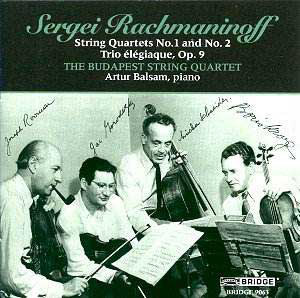In their recital at the Coolidge Auditorium of The
Library of Congress on 4th April 1952 the Budapest Quartet
and Artur Balsam programmed an all Rachmaninoff programme. The Quartet
disinterred the two incomplete apprentice quartets – both in two movements
only, in the edition by Dobrokhotov and Kirkor – and added the Op 9
Trio with Balsam. All these are early works, the Quartets dating from
1889 and 1896 and the Trio from 1893, though it was substantially revised
in 1907 and again during 1917.
The 1952 line-up of the Quartet was Joseph Roisman,
Jac Gorodetzky, Boris Kroyt and Mischa Schneider. Gorodetzky, though
Russian like the others, came from a different musical background inasmuch
as he was from the Franco-Belgian school and had been the second violin
of the Guilet Quartet, distinguished exponents of the repertoire and
one of France’s best pre-War Quartets. As Alexander Schneider always
maintained, despite their Russian birth the Budapest considered themselves
essentially Germanically trained and so the French orientated Gorodetzky,
who replaced Edgar Ortenberg, contributed an admixture of lightness
and flexibility to the quartet’s texture.
The then seldom-performed Quartets (much less so even
than now) emerge well from these performances. The First opens replete
with more than a whiff of the Budapest’s occasional perfumed style and
Boris Kroyt, whose viola has a substantial and prominent place in the
ensemble, begins a little hoarsely, though this is exacerbated by the
rather clinical acoustic of the Coolidge Auditorium. The second movement,
a Scherzo, opens in boldly confident style, with a second subject pizzicato-led
and of moderate gravity, well-played and wittily done. All the works
on the disc owe a huge and unignorable debt to Tchaikovsky and this
one more than most. The Second Quartet shows a somewhat greater weight
of melodic inspiration, its slow second movement being especially intriguing.
It has a sepulchral Passacaglia like form which gains inexorably in
emotive power throughout its ten minute length and the eventual return
to the saturnine opening is well-judged by the players with just the
right weight of withdrawn tone.
The Trio features Joseph Roisman, Mischa Schneider
and Artur Balsam. I like the rise and fall of Balsam’s strong chording
in the first movement and even the rather slithery string playing at
5.00 – it’s excitingly done. Balsam plays the passage from 7.02 onwards
with true singing tone with underpinning by the strings and the playing
generally is marked by metrical flexibility. Roisman and Scheider exchange
phrases at 17.00 onwards with masterly understanding and tonal blend.
In the Quasi variazioni second movement, which are based on The Rock,
a flowing tempo is accompanied by an expressive profile – this is Rachmaninoff’s
tribute to Tchaikovsky who had been so impressed by The Rock that he
offered to conduct the first performance and in the avowed tradition
of Tchaikovsky’s own elegiac trio, itself dedicated to Nikolai Rubinstein.
In the finale Balsam is incendiary – even banging at 4.20, a feature
doubtless magnified by the dry recording – but his dynamics are good
and the string players though not always watertight of ensemble make
a fine showing especially in the explicitly Tchaikovskian draining away
ending to the work.
The lack of bloom of the Coolidge Auditorium is a simple
fact of acoustic life - admires of the Quartet won’t hesitate to acquire
these performances despite the unflattering nature of the sound – because
discographically these are tremendously interesting additions to the
Budapest’s corpus of surviving works. Notes are by the perceptive if
here slightly non-committal Harris Goldsmith.
Jonathan Woolf


